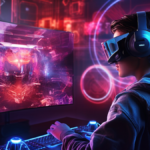The Future of AI in Action Games: What’s Coming in 2024?
The landscape of action games is on the brink of a transformative evolution, driven by rapid advancements in artificial intelligence. As we approach 2024, the integration of AI promises to redefine how players interact with virtual worlds, offering smarter NPCs, more dynamic environments, and personalized gaming experiences. This article explores the imminent innovations and potential breakthroughs that are set to revolutionize the genre. From cutting-edge AI algorithms to enhanced realism and interactivity, we delve into what gamers can expect in the upcoming year, positioning 2024 as a pivotal moment for the future of AI in action games.
The Future of AI in Action Games: What’s Coming in 2024?
Advancements in artificial intelligence (AI) are set to revolutionize the action gaming industry in 2024. As technology evolves, both developers and gamers can expect more immersive, challenging, and dynamic experiences. Here are some key aspects to anticipate.
Enhanced Enemy AI Behavior
One of the most significant improvements will be in enemy AI behavior. Instead of predictable patterns, enemies will adapt to the player’s strategies. This will involve using learning algorithms to understand and counteract player tendencies, making each encounter unique and challenging. Expect smarter tactics, from flanking operations to coordinated attacks that genuinely test player skills.
Procedural Content Generation
With procedural content generation, AI will be capable of creating game levels, missions, and even entire worlds on the fly. This approach will ensure that each playthrough offers a distinct experience, increasing the replay value of action games. Developers are already exploring these possibilities, and 2024 will likely see a broader implementation, providing endless variety and unpredictability.
Dynamic Storytelling
Dynamic storytelling powered by AI will allow narratives to evolve based on player choices and actions. This represents a significant shift from linear storytelling, giving players a sense of agency and personalization. AI will track the player’s decisions and adjust the storyline, characters, and outcomes accordingly, ensuring that no two experiences are the same.
Improved NPC Interactions
Non-Player Characters (NPCs) will become more sophisticated, featuring realistic behaviors and interactions. AI advancements will enable NPCs to remember past interactions with players, react to their presence, and even build relationships over time. This will create a more engaging and lifelike world, making the game environment richer and more immersive.
Real-Time Environment Adaptation
AI will also drive real-time environment adaptation, where the game world responds dynamically to the player’s actions. This could include altering weather conditions, changing enemy placements, or even modifying terrain based on players’ strategies. These adjustments ensure that the game remains challenging and visually appealing, adapting to keep players on their toes.
| Feature | Description |
|---|---|
| Enhanced Enemy AI Behavior | Adaptive enemies that learn from player strategies and employ smarter tactics. |
| Procedural Content Generation | AI-driven creation of unique game levels, missions, and worlds for increased replay value. |
| Dynamic Storytelling | Player-driven narratives that evolve based on choices and actions. |
| Improved NPC Interactions | More lifelike and interactive NPC behaviors, enhancing immersion. |
| Real-Time Environment Adaptation | Dynamic game world changes in response to player actions and strategies. |
FAQs
What new AI technologies are expected to be integrated into action games in 2024?
In 2024, we can expect a series of advanced AI technologies to transform action games. The inclusion of machine learning algorithms will enable NPCs to exhibit more human-like behaviors, adapting dynamically to player tactics. Additionally, the use of natural language processing (NLP) will enhance in-game interactions, allowing for more fluid and immersive conversations between players and AI characters. Moreover, procedural content generation driven by AI will create unique environments, missions, and challenges tailored to individual playstyles, ensuring that no two gaming experiences are exactly alike.
How will AI enhancements impact the overall player experience in action games?
AI enhancements are poised to significantly elevate the overall player experience in action games. With advancements in AI-driven enemy behavior, players can expect more challenging and unpredictable encounters, increasing engagement levels and replayability. The integration of AI in game design ensures more dynamic and responsive game worlds, where NPCs react to player actions in real-time, creating a more immersive and realistic gameplay experience. Furthermore, AI’s ability to constantly learn and adapt from player behavior will result in more personalized gaming experiences, catering to individual preferences and skill levels, thereby providing a balance of challenge and accessibility.
What role will AI play in enhancing the graphics and realism of action games in 2024?
In 2024, AI will play a crucial role in enhancing both the graphics and realism of action games. Technologies such as AI-driven rendering and deep learning-based texture generation will significantly boost graphical fidelity, resulting in more detailed and lifelike visuals. AI will also be used to improve animation quality, with algorithms capable of generating more natural and fluid character movements. Additionally, the application of AI in real-time physics simulations will bring about more realistic environmental interactions, making game worlds feel more tangible and believable. These advances will collectively contribute to a heightened sense of immersion and realism, blurring the lines between virtual and real worlds.
What ethical considerations are there regarding the use of AI in action games?
The integration of AI in action games raises several important ethical considerations that developers and stakeholders need to address. One major concern is the potential for AI-driven content to perpetuate or amplify existing biases, leading to unfair or discriminatory in-game scenarios. Additionally, the use of AI to create highly realistic and immersive environments might raise questions about player addiction and the psychological impact of prolonged exposure to virtual worlds. There is also the issue of data privacy, as AI systems often require extensive data collection to function optimally. Ensuring that player data is handled securely and transparently is paramount. Finally, considerations around the autonomy and decision-making capabilities of AI within games will necessitate careful balancing to maintain player agency and prevent unintended consequences.




























Post Comment